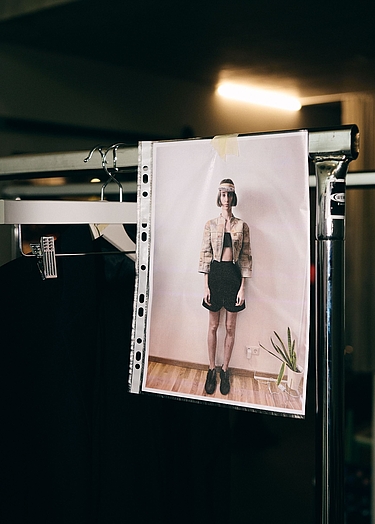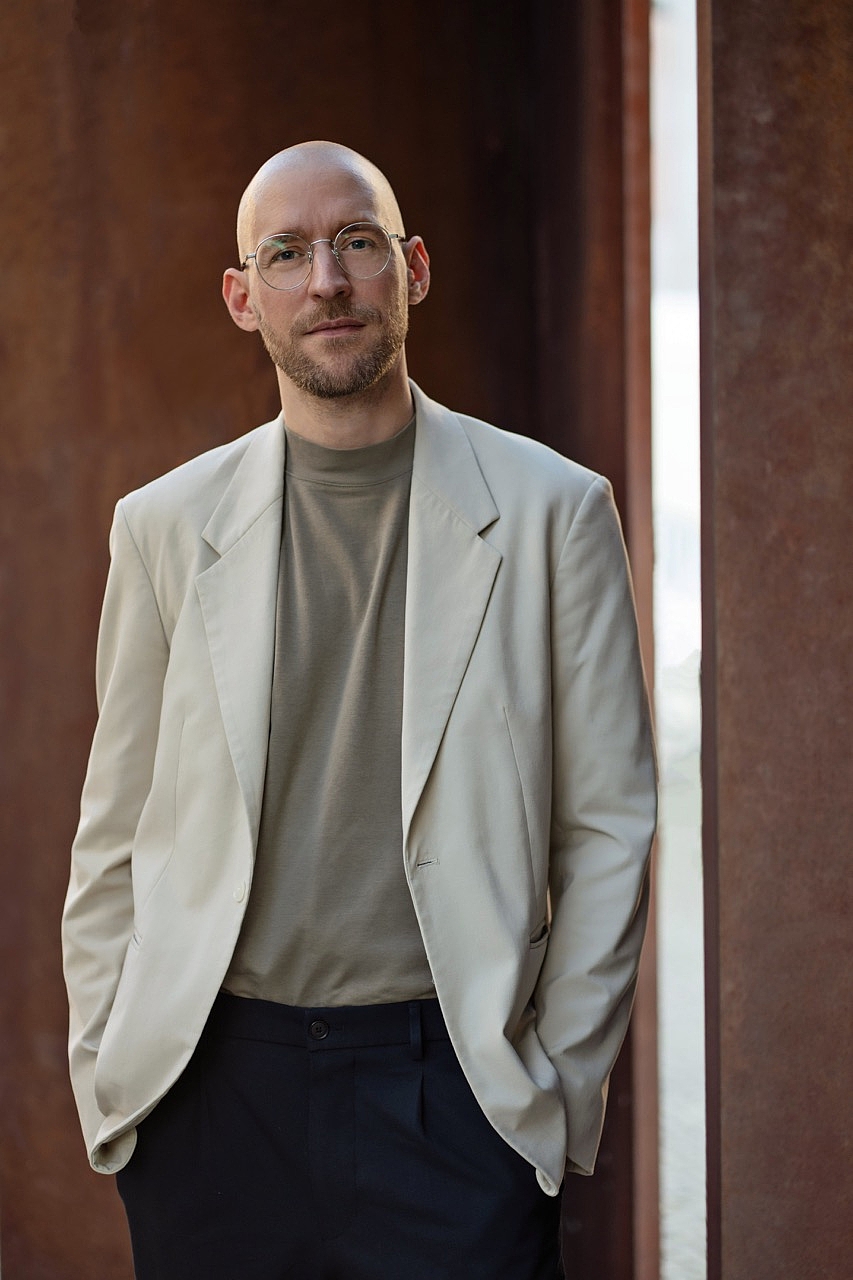
Interview

In a world that inherently places a high premium on outward appearances, the fashion industry presents its unique set of challenges. Young professionals often face high performance pressures, precarious working hours, and poor pay. Over the years, Florian Müller has observed these issues and has made it his mission to raise awareness within the industry. With his campaign ‘Mental Health in Fashion,’ Müller, an expert in communication and psychology, calls for an urgent need to break the silence surrounding mental health issues in the fashion industry. He travels the world, raises awareness, and builds networks. We spoke to Müller about the current state of awareness, his behind-the-scenes efforts, and why this cause is so personal to him.
Tell us about your initiative 'Mental Health in Fashion'. What's it all about?
The 'Mental Health in Fashion' initiative aims to break the silence around mental health in the fashion industry. Our goal is to foster awareness and understanding of the diverse psychological challenges faced by individuals in this dynamic field—from immense pressure and intense competition to insecure working conditions and the constant demand to set trends. By highlighting the link between working conditions in the fashion industry and mental well-being, we strive to cultivate a culture of support and openness.
"Our goal is to foster awareness and understanding of the diverse psychological challenges faced by individuals in this dynamic field."
Our approach combines education and sensitization to establish a network of understanding and support that offers not only breathing space but also practical aid. We address the industry's impact on the mental health of those already affected and the risks posed by working conditions. We also shine a light on the entire supply chain to illustrate the complex relationships between consumer behavior, industry structures, and mental well-being. The precarious production conditions of factory workers and the beauty ideals propagated by the fashion industry can contribute to anxiety disorders or eating disorders among other factors.
We advocate for exposing harmful structures and emphasizing the need for better protection for people with mental health issues, without stigmatizing or excluding individuals. The goal is to create positive changes through open dialogue and foster a supportive environment for mental health in the fashion industry. These efforts are crucial as the sometimes unhealthy signals sent by the industry affect not only those within but also those outside the fashion world.
When and how did the idea for 'Mental Health in Fashion' first arise, and what gave you the crucial impulse to start it?
My profound interest in mental health stems from my studies in psychology, which was further shaped by my early experiences in the Paris fashion scene in the early 2000s. There, I observed how people managed to wear luxury fashion despite low wages or unpaid work—whether through gifts or significant discounts—and enjoyed the status of being part of an 'elite' group, while simultaneously struggling to cover their basic costs. This discrepancy between appearance and reality fascinated me and led me to intensely study the psychological backgrounds of this lifestyle. Many appeared anything but happy behind their glamorous facade, which inspired me to write my thesis on this phenomenon.
Over the years, heightened by my psychotherapeutic training, I witnessed an increase in mental burdens and illnesses in the fashion industry. These insights motivated me to deepen my competencies in clinical psychology and invest years in developing a campaign to highlight these issues. Finally, my efforts were recognized at the 'Education for Sustainable Development' event organized by UNESCO and the German Federal Ministry of Education and Research, which was the decisive push to officially launch my 'Mental Health in Fashion' initiative.
You have traveled the world with 'Mental Health in Fashion'. What have you experienced, and how has the feedback been?
Indeed, my campaign is global in scope, and its international aspect is very important to me. While some problems are universal, there are also many regional differences in people's realities. In my campaign, terms like sustainability, mental health, or diversity come up. It's interesting to see how these words are defined differently. When we talk about visibility and understanding, it's crucial not just to understand myself better but also to understand what the person opposite me needs. For example, I experienced different reactions to my campaign at a university in San Francisco compared to my students in Berlin, Hong Kong, or Taipei.
"Understanding visibility and needs is crucial, and it's important not just to understand myself better but also to understand what the person opposite me needs."
Exploring these sometimes quite contrary reactions to my campaign is essential to work out an understanding approach on all sides. We often find complex supply chains in fashion that stretch across the world—I try to break down part of this complexity by talking to people to better understand their needs and living conditions. Besides my educational work in academic and school settings, I have also held numerous talks and lectures at fashion fairs like SEEK in Berlin, CentreStage at Hong Kong Fashion Week, and the sustainability platform Green Fashion India in Nagpur. Generally, reactions are positive; many people are grateful for the openness and support.
How can entrepreneurs and employers in the fashion industry contribute to creating an environment that supports and promotes mental health?
By raising awareness and supporting open discussions about this topic! Employers, for example, can offer specific training programs that empower employees to recognize mental issues and respond appropriately, ideally in cooperation with experts and tailored to the needs of the industry. My involvement with 'Mental Health in Fashion' includes developing such programs in partnership with brands. Promoting mental health is not only ethically necessary but also positively affects employee productivity and well-being. Additionally, flexible working models are crucial to allow employees to balance work and personal life effectively. An open communication culture, where employees can freely discuss their mental health, is also essential. Companies should regularly seek feedback and continuously adjust their approaches to support mental health. By taking their employees' needs seriously and creating a supportive environment, they make a significant contribution to improving mental health in the fashion industry.
Especially young people often face extreme performance pressure. How can newcomers in the fashion industry deliver the required performances while staying mentally healthy?
The challenges in the fashion industry are not only individual but also structural. Therefore, I advocate for including competencies in mental health in the training at fashion and design schools. Newcomers should be aware of the expectations and realities of the industry and learn to maintain their boundaries. I advise engaging in exchange with industry peers and seeking external support. It's important to be mindful of one's needs, set boundaries timely, and critically reflect on one's goals. Collaborating with others offers the opportunity to think beyond standard industry practices and work together for a healthier work environment. A strong awareness of one's mental health and mutual support are significant to succeed and be content in the fashion industry long-term
"The challenges in the fashion industry are not only individual but also structural. Therefore, I advocate for including competencies in mental health in the training at fashion and design schools."
You have been working at a high level in the fashion industry for many years – so you are also thematically in the thick of it. What do you do to stay mentally healthy?
In my career, I have faced challenges that strained my mental health—high pressure, expectations, constant deadlines, and irregular working hours, to name a few. This often leaves little room for self-care.
To organize my thoughts and identify stress factors, I rely on regular self-reflection. Despite the difficulties in prioritizing sufficient sleep, healthy eating, and exercise in the fashion industry, I also strive to maintain my physical health as best I can—when the gym is not an option, walking helps to relieve stress. A supportive network of family, friends, and colleagues is also indispensable for sharing experiences and fostering mutual understanding. It's a continuous process I work on, with good and bad days, but I strive to be mindful of myself and actively maintain my mental health.
I want to emphasize that prevention and the treatment of a specific illness are two different aspects. If you feel mentally overwhelmed over an extended period, you should definitely seek professional help. In this case, visiting a general practitioner can be a wise first step to rule out organic causes and possibly be referred to the right place.
You describe 'Mental Health in Fashion' as a movement. Where do you want to go with this? What is your vision for the future?
My vision for 'Mental Health in Fashion' is to effect sustainable change in the culture of the fashion industry that places mental health at its core. The goal is to sharpen awareness, promote dialogue about mental illnesses, and establish a supportive community that offers openness and help. I am in discussion with research institutions for studies, plan to further develop my training programs, and expand cooperation with international fashion brands and events like the ASVOFF Fashion Film Festival in Paris, where I curate a special film category on ‘Mental Health in Fashion’, emphasizing the importance and reach of our concern.
Another focus is on cooperation with educational institutions to more strongly integrate mental health into the training of fashion and design students. The goal is for future generations in the fashion industry to be equipped with the necessary knowledge and tools to take care of their mental health.
In the long run, I aim to achieve a cultural shift that understands mental health as an integral part of the work environment in the fashion industry. Initial inquiries from brands to train their executives regarding mental illnesses confirm the need and interest in this initiative. My goal is to shape an industry that provides a supportive and healthy environment for all involved, allowing them to fully realize their potential. The fashion industry, known for setting trends and sometimes sending unhealthy signals, can now be a leader by advocating for mental health and setting positive impulses.
"My goal is to shape an industry that provides a supportive and healthy environment for all involved, allowing them to fully realize their potential."

Florian Müller studied business administration and psychology in Berlin and Paris and began his career in the PR industry in Paris before working for designer Martin Margiela. After returning to Berlin, he founded a creative agency specialized in fashion, sustainability, and mental health. Müller collaborates with fashion weeks, teaches at universities, and advocates for mental health in the fashion industry.